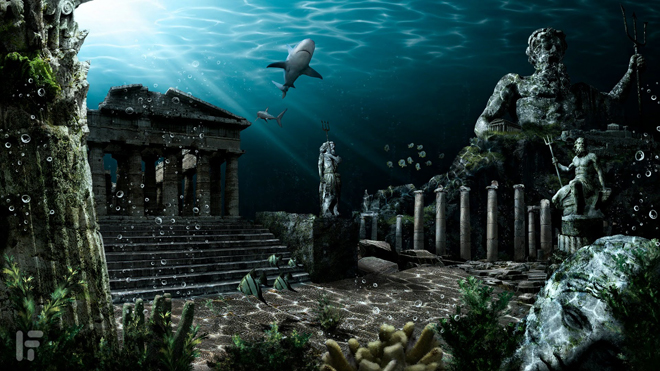Let’s dig up to most theories of the Atlantis! It could be true, could be not, depends on your perception!

Atlantis, once thought to be a mid-Atlantic continent, is believed to have suddenly sunk into the ocean.
The idea that Atlantis was an actual historical place, and not just a legend invented by Plato, didn’t surface until the late 19th century. In his 1882 book, Atlantis, the Antediluvian World, the writer Ignatius Donnelly argued the accomplishments of the ancient world (such as metallurgy, language and agriculture) must have been handed down by an earlier advanced civilization, as the ancients weren’t sophisticated enough to develop these advances on their own. Assuming the Atlantic Ocean was only a few hundred feet deep, Donnelly described a continent flooded by shifting ocean waters that sank in the exact location Plato said it did: in the Atlantic Ocean just outside the “Pillars of Hercules,” the two rocks that mark the entrance to the Straits of Gibraltar. Long after modern oceanography and a greater understanding of plate tectonics poked holes in his shifting-waters thesis, some continue to cling to Donnelly’s theory, mostly due to its adherence to Plato’s placement of Atlantis in the mid-Atlantic.
Atlantis was purportedly swallowed up by the Bermuda Triangle.
In the 1970s, Charles Berlitz, grandson of the founder of renowned language schools and author of numerous books on paranormal phenomena, expanded on Donnelly’s theories. He claimed Atlantis was a tangible continent off the Bahamas that succumbed to the notorious “Bermuda Triangle,” an area of the Atlantic where numerous ships are said to have vanished under mysterious circumstances. Supporters of this theory cite the discovery of structures resembling man-made walls and streets off the coast of Bimini. However, scientists have examined these formations and determined them to be natural beach-rock formations.
Another theory posits that Atlantis was actually Antarctica.
This hypothesis, popularized by Charles Hapgood in his 1958 book Earth’s Shifting Crust, which featured a foreword by Albert Einstein, suggests that around 12,000 years ago, the Earth’s crust shifted. This displacement relocated the continent that eventually became Antarctica from a location much farther north than its present position. In this scenario, Antarctica was a more temperate landmass that was home to an advanced civilization. However, the sudden shift to its current icy location led to the demise of the civilization, as their magnificent city was purportedly buried under layers of ice. Hapgood’s theory emerged before the scientific community fully grasped plate tectonics, relegating his idea of a “shifting crust” to the periphery of Atlantean beliefs.
The theory suggests that the story of Atlantis was a mythical retelling of the Black Sea Flood.
According to this hypothesis, Atlantis itself may have been fictional, but its demise was inspired by a real historical event: the breaching of the Bosporus by the Mediterranean Sea, leading to the flooding of the Black Sea around 5600 B.C. During this event, the Black Sea, which was originally a freshwater lake half its current size, experienced a rapid inundation with seawater, submerging civilizations that thrived along its shores under hundreds of feet of water in a short period, possibly less than a year. As the affected inhabitants scattered, they likely spread tales of the catastrophic deluge, which may have eventually evolved into Plato’s account of Atlantis thousands of years later.
The theory posits that Atlantis is the story of the Minoan civilization, which thrived in the Greek islands around 2500-1600 B.C.
This recent Atlantean theory focuses on the civilization that prospered on the Greek islands of Crete and Thera (now Santorini) over 4,000 years ago: the Minoans, named after the legendary King Minos. Regarded as Europe’s earliest great civilization, the Minoans erected magnificent palaces, constructed paved roads, and were the first Europeans to employ a written language (Linear A). Despite their achievements, the Minoans mysteriously vanished from historical records, sparking speculation of a connection between their enigmatic disappearance and Plato’s narrative of Atlantis.
Historians suggest that around 1600 B.C., a massive earthquake rocked the volcanic island of Thera, triggering an eruption that ejected 10 million tons of rock, ash, and gas into the atmosphere. Subsequent tsunamis, spawned by the eruption, devastated Minoan cities across the region, potentially leaving them vulnerable to incursions from the Greek mainland.
Last theory is shocking: It never actually existed, Plato fabricated the notion of Atlantis; it never actually existed.
Plato is credited with inventing the concept of Atlantis, with most historians and scientists viewing his account of the lost kingdom as purely fictional. According to this perspective, the Greek philosopher crafted Atlantis as a representation of an ideal civilization, using its downfall as a cautionary tale illustrating the consequences of human arrogance and overreach. Despite the absence of any written records beyond Plato’s dialogues, along with the extensive collection of surviving ancient Greek texts, modern advancements in oceanography and ocean-floor mapping have failed to uncover any evidence of a submerged civilization matching Plato’s description.
News
WNBA Fans Buzz Over “Anne Splashaway” Nickname for Caitlin Clark
Upon witnessing Caitlin Clark’s three-point prowess during the Indiana Fever’s training camp, a WNBA fan took to social media to coin a creative nickname for the 2024 WNBA Draft’s top pick. Inspired by Clark’s sharpshooting skills, the fan cleverly dubbed…
“It wasn’t like this”: Angel Reese notes Clear Distinction in quality between NCAA and WNBA
Angel Reese, a standout college star and 2023 NCAA champion, made waves in the 2024 WNBA draft when she was selected by the Chicago Sky as the seventh overall pick. Since joining the team, Reese has been fully committed to…
“No deposit, no return mindset”: Indiana Fever Coach Establishes Standards for Caitlin Clark, Aliyah Boston, and Co Prior to Season Opener
All eyes are fixed on the Indiana Fever ahead of the 2024 WNBA season, following their acquisition of the highly coveted consensus number one overall pick, Caitlin Clark, in the 2024 WNBA draft. Amidst heightened expectations, head coach Christie Sides…
Dentist Finds What May Be A Prehistoric Human Jawbone Embedded In His Parents’ New Floor
The discovery of a human mandible embedded in travertine flooring during a home renovation in Europe has sparked curiosity and raised questions about its origins. The mandible was noticed by the homeowner’s son, a dentist, who recognized its unmistakable shape….
Researchers Have Successfully Created Artificial Cells That Act Just Like Human Cells
The University of North Carolina at Chapel Hill researchers have achieved a significant breakthrough in biotechnology by engineering artificial cells with life-like behavior using DNA-peptide technology. In their experiment, the team manipulated peptides and genetic material to create cell cytoskeletons,…
LA Sparks 1st Rounder Cameron Brink and Mother Groove to GloRilla’s Beats in Latest TikTok, Sporting $8,600 Hermes Bag
Cameron Brink shares a close bond with her mother, Michelle, often showcased on social media. Recently, they posted a TikTok video dancing to the rhythm of rapper GloRilla’s “Yeah Glo!” In the clip, the former Stanford standout was spotted accessorizing…
End of content
No more pages to load











